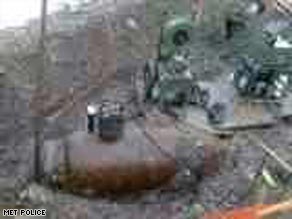WWII bomb detonated in London
- Story Highlights
- British Army engineers detonate a large World War II bomb in London
- Ministry of Defense: Bomb was the largest found in the capital since 1975
- Disposal experts used strong magnets to stop timer after bomb started ticking
- Next Article in World »
LONDON, England (CNN) -- A neighborhood in east London was getting back to normal Saturday after British Army engineers detonated a large World War II bomb unearthed this week on a building site, officials said.

Army engineers covered the bomb with sand to minimise the risk of an explosion.
An Army bomb disposal team carried out a controlled explosion on the 2,200-pound German warhead at 5:55 p.m. (12:55 p.m. ET) Friday, London's Metropolitan Police said. Video of the blast showed brown dirt, debris and black smoke shooting into the air when the bomb went off.
There were no reports of any injuries or damage to surrounding property after the blast, the police and Ministry of Defense said. The public was allowed back into the industrial neighborhood by Friday night, authorities said.
Two subway lines and a rail line in the area, which were shut down after construction crews discovered the bomb Monday, were running normal service Saturday, transportation officials said.
London's transit authority, Transport for London (TfL), said the police and army gave permission for its engineers to check the tracks less than an hour after the controlled explosion. The tracks were clear of debris and damage and services resumed at 7:13 p.m. (2:13 p.m. ET), TfL said.
Contractors preparing a waterway near the site of the future Olympic Park discovered the bomb Monday. The Ministry of Defense said the bomb, which measured four feet by two feet, was the largest one found in the capital since 1975.
The bomb was "enormous," said Simon Saunders, a spokesman for the British Army's London district.
At one point during the week the bomb started ticking, which suggested a timing device, Saunders said. Disposal experts put strong magnets next to the bomb to shut down the clockwork and the ticking stopped, he said.
It's not uncommon for World War II-era bombs to be unearthed in Europe. In London, which suffered the aerial bombardment of the Blitz, bombs are uncovered two or three times a year, Saunders said.
The London Blitz lasted from September 1940 until May 1941. German bombers attacked the city every day or night for the first two months, but the worst night was the last -- May 10, 1941, when 3,000 people were killed in London, according to the Museum of London.

Much of the Blitz focused on east London.
In all, more than 20,000 people were killed in the Blitz, short for "Blitzkrieg," the German word for "lightning war."
All About World War II • East London

 Sit tight, we're getting to the good stuff
Sit tight, we're getting to the good stuff
